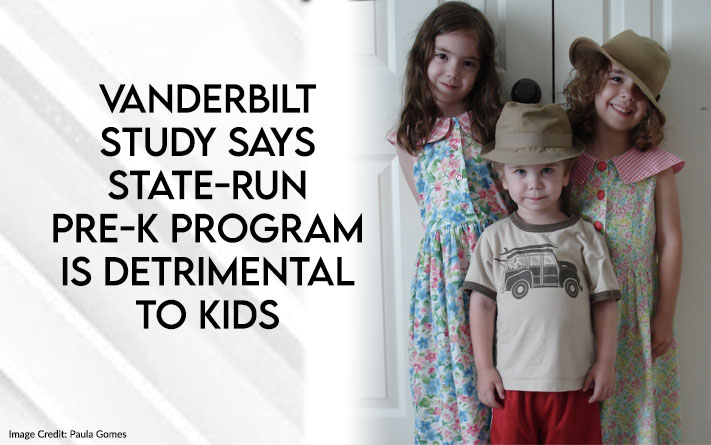Image Credit: Paula Gomes
The Tennessee Conservative [By Paula Gomes] –
Researchers at Vanderbilt University’s Peabody College collected data on almost 3 thousand low-income children in Tennessee for more than a decade only to find that attending the state’s voluntary Pre-K program resulted in negative effects by third grade that continued to get worse over the following three years.
All of the children in the study applied to free, public Pre-Kindergarten programs. Some were admitted by a lottery system, and others were not accepted which made the study as close to a randomized, controlled trial as one could hope for in the real world.
Lead author Dale Farran and her co-authors followed both groups through sixth grade. They predicted higher test scores on school readiness from the kids who attended the state’s Pre-K after the first year which was indeed the case. But then something unexpected happened.
After third grade, those children were doing worse than the children in the control group, testing poorly on one of the three state achievement tests. By sixth grade all three tests (math, science and reading) were negatively affected.

But the bad news didn’t end with poor educational performance, behavior also was affected. By third grade, the Pre-K kids were getting in trouble for minor issues but by sixth grade Farran and her fellow researchers were seeing both minor and major violations.
What’s more, the children who attended no Pre-K program of any kind started outperforming the Pre-K children by second grade.
*** Click Here to Support Conservative Journalism in Tennessee. We can’t cover stories like this without your support!***
President Biden has championed Federally funded universal prekindergarten for 3 and 4 year olds, and mentioned it in his recent State of the Union address.
Tennessee currently spends almost $86 million a year on its Pre-K program, and last week, bills were amended in the Tennessee Assembly to redirect half of the money currently going to the Tennessee Promise endowment to Pre-K instead.
Lawmakers questioned that decision to further fund the state’s Pre-K program citing the poor outcome from the Vanderbilt study.
Educational Pre-K programs tend to focus on drilling kids on basic skills such as worksheets for tracing letters and numbers. But according to Farran, higher-income families do not choose this kind of program for their 3 and 4 year olds, opting instead for play-based schools that include art, movement, music and nature. In other words, good old fashioned play.
About the Author: Paula Gomes is a Tennessee resident and reporter for The Tennessee Conservative. You can reach Paula at paula@tennesseeconservativenews.com.



